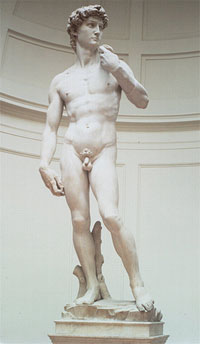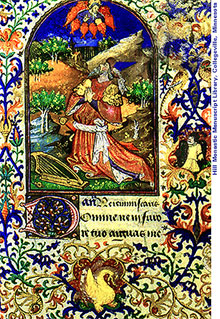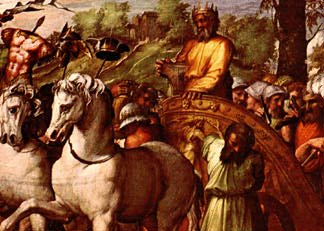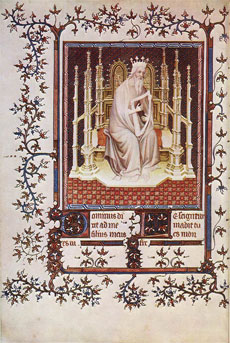Whose Agenda Is It Anyway?
Guest essay by Sam Rowen (PhD, Michigan State), who has spent his adult life in international ministries, most recently in theological education in Asia.
For Sunday July 23, 2006
Lectionary Readings (Revised Common Lectionary, Year B)
2 Samuel 7:1–14a or Jeremiah 23:1–6
Psalm 89:20–37 or Psalm 24
Ephesians 2:11–22
Mark 6:30–34, 53–56
 |
Michelangelo's David. |
In 1981 Richard Dreyfuss portrayed a paraplegic in the movie “Whose Life Is It Anyway?” His character, Ken Harrison, was an artist who made sculptures. After a serious automobile accident he was paralyzed from the neck down. The movie takes place in a hospital room in which Dreyfuss plays the part of a man joking about life. He says, “You’ll get a lot of laughs…before you cry.” Eventually he concludes that life is not worth living if he is not able to pursue his creative passion for making sculptures. People try to convince him that he should continue to live, but he gives the argument which no one seems to be able to effectively challenge: “Whose life is it anyway?”
This is the fundamental argument underlying many of the ethical decisions which we face it contemporary society. The argument for abortion is simply that a woman has the right to choose what happens to her own body. It all sounds so logical because it is grounded in the concept of human rights (and something you consider a "right" is typically not up for compromise). Many have taken up this cause for human rights. It just seems so logical and ethical.
 |
King David, 15th century Book of Hours. |
On a recent visit to the United States the Premier of China Wen Jiabao was constantly bombarded with questions on human rights from the people he encountered. His response was, “We have different understandings of human rights. You trace your understanding of human rights to Rousseau in the time of the Enlightenment. We trace our understanding back to a 13th century Chinese philosopher.” Whoever did the research for the Premier did an excellent piece of work. The language of human rights grew out of a time in history when people felt more secure in understanding their life in the world without reference to God. So the emphasis became human rights, not God-given rights. The Bible doesn’t use the language of human rights. In fact, the disciples of Jesus have no rights. In the words of the Apostle Paul, “You are not your own, for you were bought with a price. So glorify God in your body.” (1 Corinthians 6:19–20).
The Bible discusses these ethical questions under the rubric of justice. It is God’s kingdom and its justice (righteousness) we are to seek (Matthew 6:33). It is in the pursuit of justice that we are compelled to treat people made in the Imago Dei with dignity and nurturing care. However, it is not always easy to discern whether what we pursue in life is our agenda or God’s agenda.
In this week’s reading from 2 Samuel 7:1–14 we see David desiring to do something significant for the Lord. The Lord had granted him peace from his enemies. David had the luxury of reflecting on what he could do out of gratitude to the Lord. He decided to build a place to house the Ark of the Covenant. It was not going to be any old house, but one of the finest cedars. You can almost follow the reasoning. It seems so logical. When we build a house for the Lord it must be the best. The Lord deserves only the best. We do not want to embarrass the Lord in the presence of the nations. David even seeks counsel. Nathan, the prophet, tells him to go ahead with the project.
 |
Raphael's Triumph of King David. |
The only problem was that the Lord had a different agenda. He spoke to Nathan and reminded him that the Ark of his presence had always been in a tent which was very mobile. The people could move the tabernacle with the Ark of the Covenant and the people would be continually reassured of God's presence with them. Now during this time of peace David thought it was time to do something that reflected the stability of the present moment. Nathan was told to tell David that the Lord would make him a house (v. 11). Evidently David’s plans were his own agenda. It was not for a lack of desire to do something pleasing to God. It was, however, a lack of wisdom. Wisdom always seeks to discern God’s agenda in life.
 |
King David, illumination on parchment, 14th century, by Andre Beauneveu. |
In the alternate reading in Jeremiah 23:1–6 we see how easy it is to be seduced into thinking that we are operating on God’s agenda. The false Shepherds receive a resounding judgment because they are leading the people astray. How different they are from the Good Shepherd who is the only one who can lead people to an understanding of God’s agenda. Psalm 23 is very familiar. Here we clearly see that the Lord is our Shepherd and he will lead us in the paths of justice (righteousness). The Lord will not only build the house for his people, but will also lead his people to discern and follow the Lord’s agenda. The Lord will also through David’s greater son, the Lord Jesus, provide us with a redeemer to make a way for those who have lost God’s agenda to regain it. God’s agenda is characterized by God doing what is necessary for the people to “glorify him and enjoy him forever.”
David provides for us a great example. He is described as a man after God’s own heart. It is puzzling to hear God say this of David because he was guilty of both adultery and murder. But God who is rich in mercy never forsakes him and continues to embrace him in his covenantal love. So when David hears the message given to him through Nathan, he changes his direction. He recognizes it is God’s agenda anyway. So David becomes for us an example that flexibility is necessary in discerning the will of God. We are not left alone, but have the godly examples of those who have gone before us to show us the way. Henry Wadsworth Longfellow says it so well in “A Psalm of Life:”
Lives of great men all remind us,
We can make our lives sublime.
And, departing, leave behind us,
Footprints in the sands of time.
May God grant us the wisdom to discern the difference between His agenda and our own.
For further reflection:
* Can you recall a time when you mistook your own agenda for God's agenda?
* How can we discern the difference between the two?
* Consider the role of openness to the counsel of others.
* Just what is God's agenda for the world?





